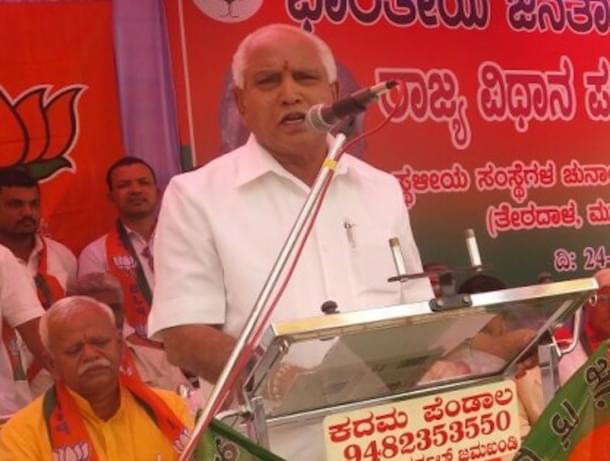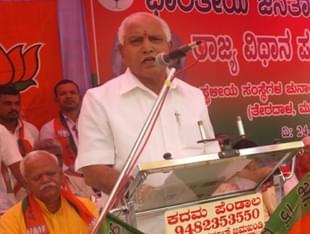Politics
Relief From HC: Will BJP Give Yeddyurappa A Frontline Role In Karnataka?
Swarajya Staff
Jan 06, 2016, 09:44 PM | Updated Feb 12, 2016, 05:29 PM IST
Save & read from anywhere!
Bookmark stories for easy access on any device or the Swarajya app.


Will a favourable verdict from the Karnataka HC change the political fortunes of BS Yeddyurappa?
The Karnataka High Court on Tuesday (5 January) quashed 15 cases against BJP Vice-President and former Karnataka CM, BS Yeddyurappa. The cases were in relation to alleged illegalities committed by Yeddyurappa in the denotification of land in Bangalore, and the FIRs were all registered by the state Lokayukta police.

Yeddyurappa had resigned as the CM of Karnataka in August 2011 after the then Karnataka Lokayukta, Justice Santosh Hegde, had made unfavourable comments about him in a report on illegal mining in the state.
Since then, Yeddyurappa’s political career had been in distress. He broke away from the BJP before the state Assembly elections in 2013 only to return in time for the Lok Sabha elections of 2014.
With yesterday’s (5 January) favourable verdict from the Karnantaka HC, Yeddyurappa’s career seems to have received a much needed boost. While the state government can appeal against the verdict, that will be a long haul. Meanwhile, the verdict enhances Yeddyurappa’s prospects to assume the leadership of the party in Karnataka, and that too at a time when the the Siddaramaiah-led Congress government is facing charges of mal-governance on all fronts.
The fact remains that the BJP does not have a leader of the stature and popularity of Yeddyurappa in Karnataka. And after the HC verdict, it would serve the party well to allow him to lead the state unit. That in turn would imply that he would be the chief ministerial candidate for the party in the next Assembly elections in 2018. The fact that Yedduyurappa will still be on the right side of 75 is important.
If the results of Delhi and Bihar assembly elections are anything to go by, the BJP must declare a chief ministerial candidate in all states well before elections. Even from the state elections which the party won, like in MP, Rajasthan, Chhattisgarh (all in 2013), Gujarat (2012), the same lesson can be drawn. The wins after May 2014 – in Haryana, Maharashtra and Jharkhand – were managed without a CM candidate, but these came immediately after the Modi wave of May 2014. In 2015, the party was unable to pull off even a decent showing in Bihar and Delhi.
If the party strategists and leadership are thinking along the same lines, then it is not unlikely that Yeddyurappa could be given a role in the central government. This will serve two purposes. One, this would bring him back into the limelight before he returns to lead the party in his home turf and, two, it would send out a message that the BJP central leadership stands in his support. As someone who endorsed Modi for PM well before the party did, the central leadership will be fairly disposed towards him.





